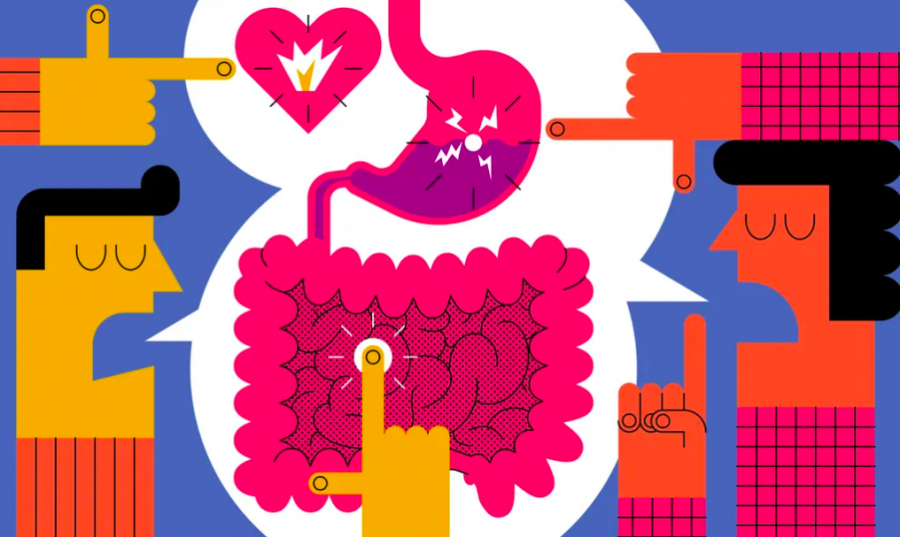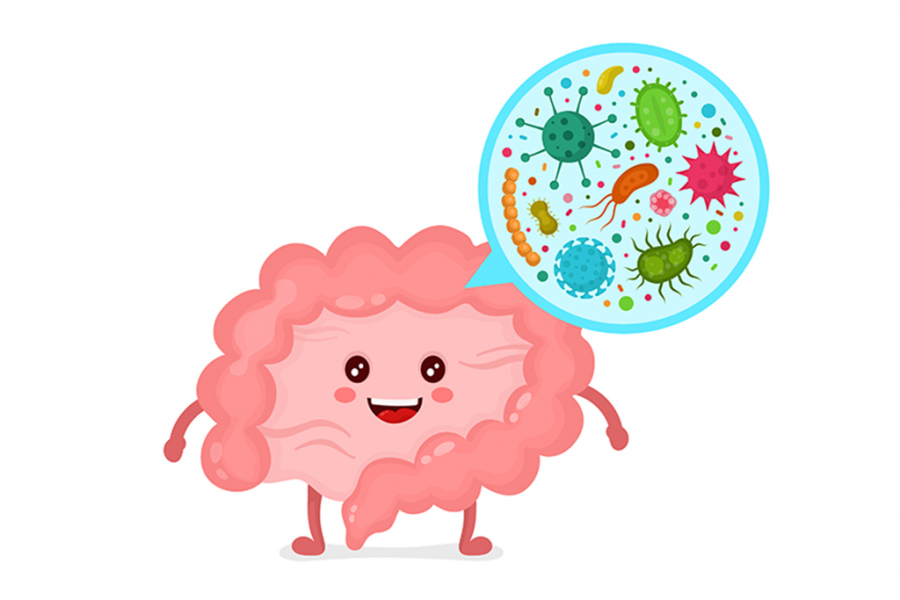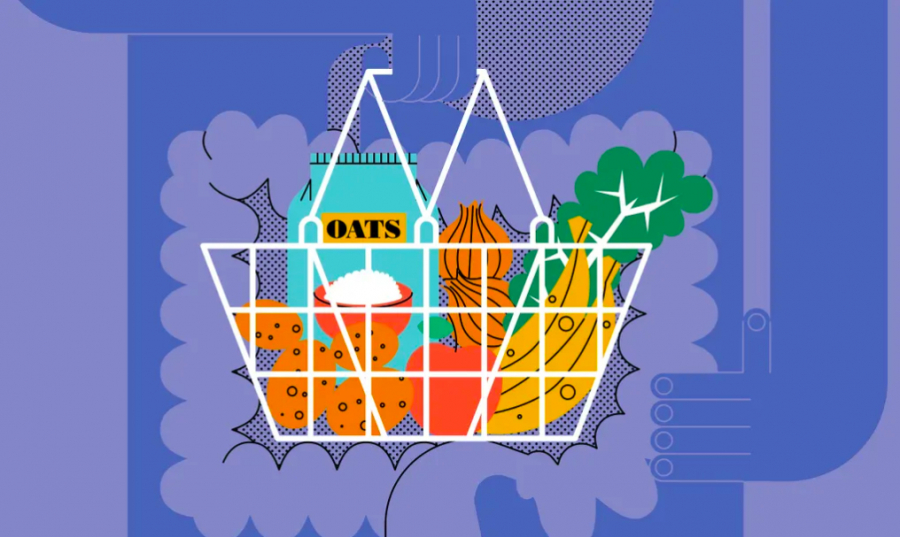Read Part 1 atThis
HOW DOES DIET AFFECT THE BRAIN?
Eating a healthy and nutritious diet has a significant impact on our mood and emotions. If you're still not entirely convinced, here are three main reasons:
1. A healthy digestive system sends positive signals to the brain.
Our gut is covered with neurons, which transmit signals to other nerve cells and are considered the most important part of the brain. This complex network of cells is called the enteric nervous system, and it can function independently of the brain and spinal cord, often referred to as the body's "second brain."
And although this "second brain" has no "thoughts" or "emotions," it doesn't simply process and digest food. The digestive nervous system communicates with the brain in many ways, playing a vital role in supplying the brain with neurotransmitters such as serotonin—a chemical that affects mood and several other cognitive functions.

The gastrointestinal nervous system communicates with the brain in many ways, affecting mood and several other cognitive functions.
Numerous studies have shown that much of the information the digestive system transmits to the brain comes from the gut microbiome, which reacts to various external influences, from diet to stress levels. It is through the activities and composition of these microorganisms that it is believed the digestive system impacts mental health.
2. A healthy diet helps you cope with life's pressures.
Along with many other factors such as genes, diet also indirectly affects how we cope with stress and trauma in life. Ted Dinan, Professor Emeritus of Psychiatry at University College Cork (Ireland), points out that studies on humans and animals show that poor diets can easily lead to poor mental health. Poor mental health not only doesn't help in the face of difficulties and setbacks but also makes you more prone to depression.
These studies also conclude that beneficial bacteria thriving in the digestive system have a positive impact on mental health. If a person who previously had a healthy diet suddenly switches to eating fast food, their microbiome will change rapidly in a very short period of time, and the beneficial bacteria in the gut will tend to decrease or disappear significantly.

Beneficial bacteria that thrive in the digestive system have a positive impact on mental health.
"A proper diet helps build a healthy microbiome, which in turn helps us cope better with stress and pressure," Professor Dinan asserted.
3. A healthy diet helps you regulate your emotions.
Dr. Johnson explained that scientists found that depressed patients had very fewbacteroidesThis type of bacteria produces the important chemical GABA (a major inhibitory neurotransmitter in the central nervous system). This neurotransmitter helps reduce the effects of stress and helps us sleep soundly through the night. If the brain doesn't receive enough GABA, it can lead to increased anxiety and insomnia.
Another important compound for the brain is the amino acid tryptophan. When we eat, tryptophan is broken down by a group of gut bacteria called trypanosomes.bifidobacteriaTryptophan forms smaller metabolites that can cross the blood-brain barrier. The brain needs a continuous supply of these tryptophan metabolites, as they are the building blocks of the mood-regulating hormone serotonin. Therefore, if we don't have enough bifidobacteria in our gut due to poor diet, this process will be inhibited, negatively impacting mental health.
WHAT CONSTITUTES A HEALTHY DIET?
Simply put, a healthy diet is one that includes healthy foods – those low in saturated fat, trans fat, free sugars, and salt. To minimize unhealthy food intake while still getting enough nutrients, you should provide your body with daily calories from foods such as: fresh fruits, vegetables, whole grains, legumes, nuts, lean protein, etc.

Use vegetable oil: Consuming excessive amounts of fats, oils, and concentrated energy sources, especially saturated and industrially produced fats, can increase the risk of heart disease and stroke. It is advisable to use unsaturated vegetable oils (olive, soybean, sunflower, or corn oil) instead of animal fats, butter, coconut oil, and palm oil, as these help the body utilize healthier fats.
Limit your sugar intake:A healthy diet should have sugars make up less than 10% of your total energy intake, and natural sugars are always better than artificial ones. You can choose fresh fruit instead of sugary snacks like cookies, cakes, and chocolate to reduce your sugar consumption. Limiting soft drinks, sodas, and other sugary beverages is also a great starting point.
Reduce your salt intake:Consuming too much salt in your daily diet increases the risk of many diseases and leads to sluggishness and poor concentration. You should prioritize foods low in salt such as green vegetables, fruits, and lean meats, while limiting the use of salty seasonings like fish sauce, MSG, and soy sauce.
STEP-BY-STEP GUIDE TO BUILDING A HEALTHY DIET
As well asdo exerciseBuilding a balanced and healthy diet isn't something that can be done easily or immediately. You should gradually change your lifestyle habits and improve your meals so that your body adjusts and you don't feel bored or tired. Here are some tips to make this process easier:
1. Start by eating a variety of fruits and vegetables every day; main meals can include starchy, fiber-rich foods such as potatoes, bread, rice, or pasta.

2. Add some nuts to yogurt and smoothies: When eating yogurt or smoothies, try sprinkling some nuts like walnuts, almonds, or chia seeds on top. These nuts are not only delicious but also very good for your health.
3. Use spinach instead of lettuce: When eating salad, try replacing lettuce with spinach. Spinach provides more vitamins A, B, E, and calcium than the same amount of lettuce, and it's also very tasty.
4. Drink unsweetened tea instead of bottled tea or soda: A bottle of tea or a can of soda bought at the grocery store contains a lot of artificial sweeteners and calories. Each month, you can reduce your calorie intake by up to 7,840 calories and 448 teaspoons of sugar by drinking unsweetened tea instead of soda or sugary drinks every day.

 VI
VI EN
EN






























